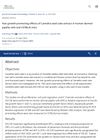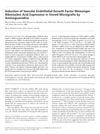Search
for
Sort by
Research
30-60 / 1000+ results
research Human Umbilical Cord Blood Mesenchymal Stem Cells Engineered to Overexpress Growth Factors Accelerate Outcomes in Hair Growth
Modified stem cells from umbilical cord blood can make hair grow faster.

research Androgens Modulate Keratinocyte Differentiation Indirectly Through Enhancing Growth Factor Production From Dermal Fibroblasts
Male hormones indirectly affect skin cell development by increasing growth factor levels from skin fibroblasts.

research Kojyl Cinnamate Ester Derivatives Increase Adiponectin Expression and Stimulate Adiponectin-Induced Hair Growth Factors in Human Dermal Papilla Cells
Kojyl cinnamate ester derivatives can promote hair growth by increasing adiponectin production in fat tissues.

research Nonanal Stimulates Growth Factors via Cyclic Adenosine Monophosphate (cAMP) Signaling in Human Hair Follicle Dermal Papilla Cells
Nonanal from fruits and vegetables promotes hair growth by increasing growth factors.

research Examination of Androgenetic Alopecia with Serum Biomarkers
Serum biomarkers like insulin-like growth factor-1 and vitamin D may help diagnose androgenetic alopecia.

research Cashmere Growth Control in Liaoning Cashmere Goat by Ovarian Carcinoma Immunoreactive Antigen-Like Protein 2 and Decorin Genes
OCIAD2 and DCN genes affect hair growth in goats by having opposite effects on a growth signaling pathway and inhibiting each other.

research IGF1 and BM-MSC Incorporating Collagen-Chitosan Scaffolds Promote Wound Healing and Hair Follicle Regeneration
Adding insulin-like growth factor 1 and bone marrow-derived stem cells to a collagen-chitosan scaffold helps wounds heal faster and regrows hair follicles.

research Dermal Fibroblasts Enhance Growth Factors Production by Androgens and Modulate Keratinocyte Proliferation and Differentiation
Androgens increase growth factors in skin cells, which may lead to acne.

research Growth Factors in Hair Organ Development and the Hair Growth Cycle
Growth factors are crucial for hair development and could help treat hair diseases.

research The Hair Growth Promoting Effect of Ascorbic Acid 2-Phosphate, a Long-Acting Vitamin C Derivative
A long-acting Vitamin C derivative helps hair grow by stimulating cells and increasing growth factors.

research Extract of Allium Tuberosum Rottler Ex Spreng Promoted Hair Growth Through Regulating the Expression of IGF-1
Garlic chive extract helped mice grow more hair by increasing a specific growth factor.

research Action Mechanism of Chamaecyparis Obtusa Oil on Hair Growth
Chamaecyparis obtusa oil may help hair grow similarly to minoxidil by affecting certain growth markers and cell factors.

research Induction of Vascular Endothelial Growth Factor Messenger Ribonucleic Acid Expression in Stored Micrografts by Aminoguanidine
Aminoguanidine increases a specific growth signal in stored hair grafts, which may help them survive better after being transplanted.

research Hair Growth-Promoting Effects of Camellia Seed Cake Extract in Human Dermal Papilla Cells and C57BL/6 Mice
Camellia seed cake extract helps hair grow by affecting cell growth and growth factor levels.

research Induction of Vascular Endothelial Growth Factor Messenger Ribonucleic Acid Expression in Stored Micrografts by Aminoguanidine
Aminoguanidine increases VEGF in stored hair micrografts, potentially improving their viability after transplant.

research Effects of Hormones and Endocrine Disorders on Hair Growth
Hormones significantly influence hair growth, with conditions like hirsutism and patterned hair loss linked to hormone levels; more research is needed for full understanding.

research Hair Growth Effect of DN106212 in C57BL/6 Mouse and Its Network Pharmacological Mechanism of Action
DN106212, an extract from a plant, is better at promoting hair growth than other tested substances by affecting hair growth factors and follicle development.

research Hair Growth Is Promoted by BeauTop via Expression of EGF and FGF-7
BeauTop helps hair grow by increasing certain growth factors.

research The Hair Growth Promoting Effect of Sophora Flavescens Extract and Its Molecular Regulation
Sophora flavescens extract may help hair grow by affecting growth factors and blocking a hair-related enzyme.

research Pilosebaceous Physiology in Relation to Hirsutism and Acne
Male hormones are important for hair and oil gland development and can cause conditions like excessive hair growth and acne.

research Exogenous IGF-1 Promotes Hair Growth by Stimulating Cell Proliferation and Downregulating TGF-β1 in C57BL/6 Mice In Vivo
IGF-1 injections help mice grow more hair by increasing cell growth and blocking a hair growth inhibitor.

research Molecular Genetic and Endocrine Mechanisms of Hair Growth
Hormones and their receptors, especially androgens, play a key role in hair growth and disorders like baldness.

research Neuroendocrinology of Epithelial Hair Follicle Stem Cells
Hormones and neuroendocrine factors control hair growth and color, and more research could lead to new hair treatment options.

research Role of Insulin Resistance and Diet in Acne
Eating high glycemic foods and drinking milk may worsen acne by increasing insulin and IGF-1 levels.

research Peppermint Oil Promotes Hair Growth Without Toxic Signs
Peppermint oil can effectively promote hair growth without being toxic.

research Further Clinical Evidence for the Effect of IGF-1 on Hair Growth and Alopecia
IGF-1 may affect hair growth and loss, but more research is needed to confirm effective and safe treatments.

research Drug Delivery System Based On Minoxidil Nanoparticles Promotes Hair Growth In C57BL/6 Mice
Minoxidil nanoparticles can potentially be a more effective treatment for hair growth than current treatments.

research Adenosine Stimulates Growth of Dermal Papilla and Lengthens the Anagen Phase by Increasing the Cysteine Level via Fibroblast Growth Factors 2 and 7 in an Organ Culture of Mouse Vibrissae Hair Follicles
Adenosine helps hair grow longer and stronger by boosting certain growth factors and signaling pathways.

research Enhancement of Human Hair Growth Using Ecklonia Cava Polyphenols
Ecklonia cava polyphenols help increase human hair growth and reduce hair loss.